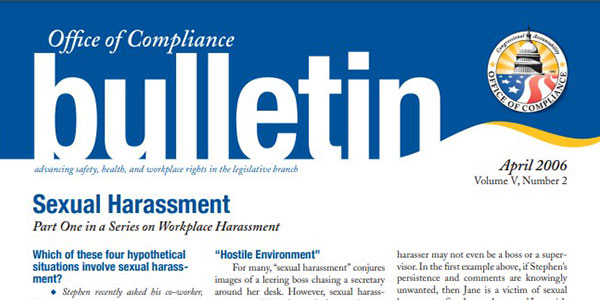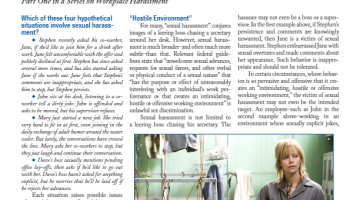Part One in a Series on Workplace Harassment
Which of these four hypothetical situations involve sexual harassment?
- Stephen recently asked his co-worker, Jane, if she’d like to join him for a drink after work. Jane felt uncomfortable with the offer and politely declined at first. Stephen has since asked several more times, and has also started asking Jane if she works out. Jane feels that Stephen’s comments are inappropriate, and she has asked him to stop, but Stephen persists.
- John sits at his desk, listening to a coworker tell a dirty joke. John is offended and asks to be moved, but his supervisor refuses.
- Mary just started a new job. She tried very hard to fit in at first, even joining in the daily exchange of adult humor around the water cooler. But lately, the conversations have crossed the line. Mary asks her co-workers to stop, but they just laugh and continue their conversation.
- Dave’s boss casually mentions pending office lay-offs, then asks if he’d like to go out with her. Dave’s boss hasn’t asked for anything explicit, but he worries that he’ll be laid off if he rejects her advances
Each situation raises possible issues of sexual harassment. Sexual harassment affects both men and women, and it takes many forms.
The Congressional Accountability Act (CAA), which is administered by the Office of Compliance (OOC), prohibits all types of unlawful sex discrimination. Under Section 201 of the CAA, the OOC processes charges of discrimination that arise in the Legislative branch of the Federal government. Legislative branch employees may contact the OOC if they feel they have been a victim and may take action through the OOC’s dispute resolution process.
“Hostile Environment”
For many, “sexual harassment” conjures images of a leering boss chasing a secretary around her desk. However, sexual harassment is much broader–and often much more subtle–than that. Relevant federal guidelines state that “unwelcome sexual advances, requests for sexual favors, and other verbal or physical conduct of a sexual nature” that “has the purpose or effect of unreasonably interfering with an individual’s work performance or that creates an intimidating, hostile or offensive working environment” is unlawful sex discrimination.

